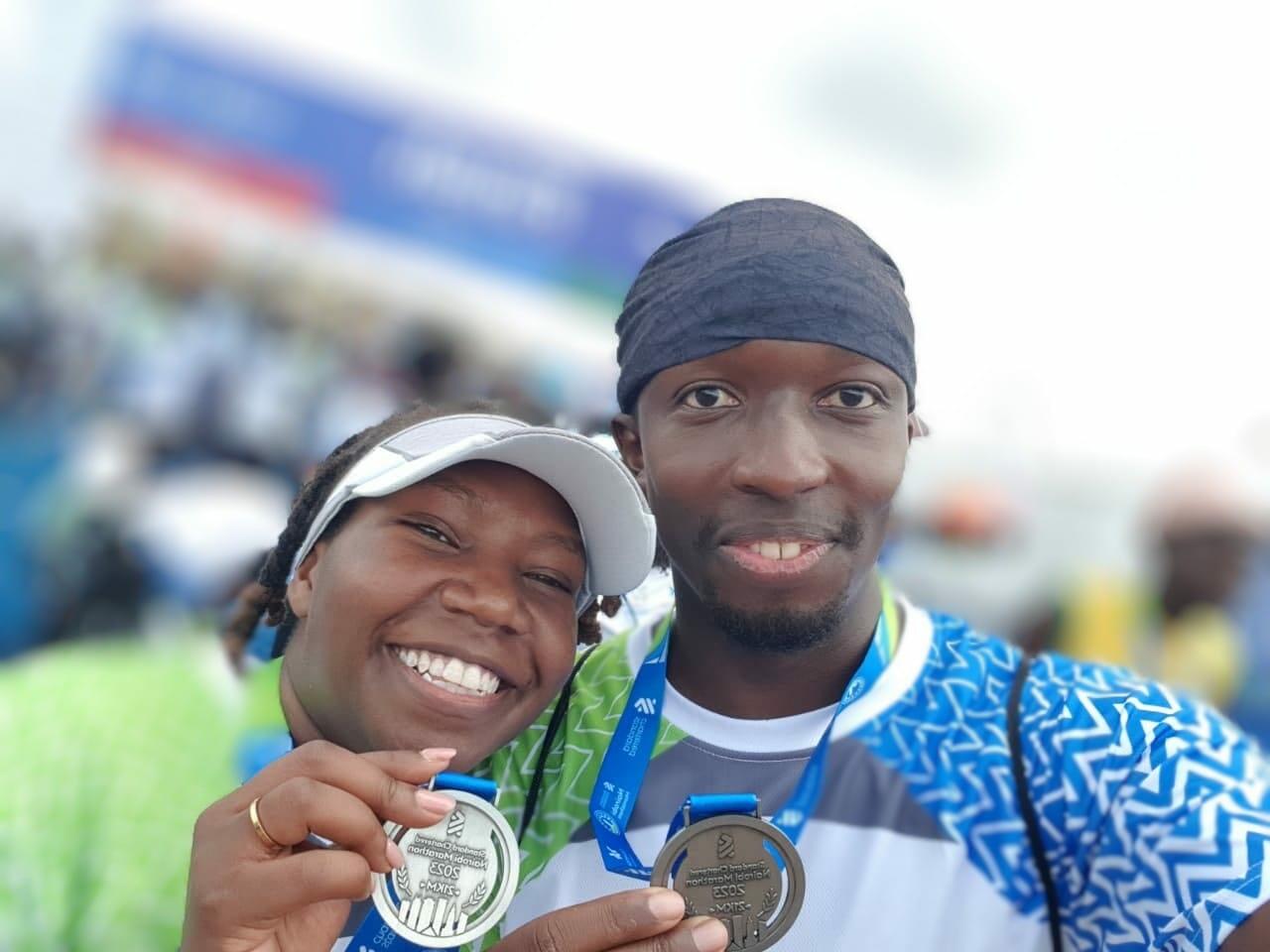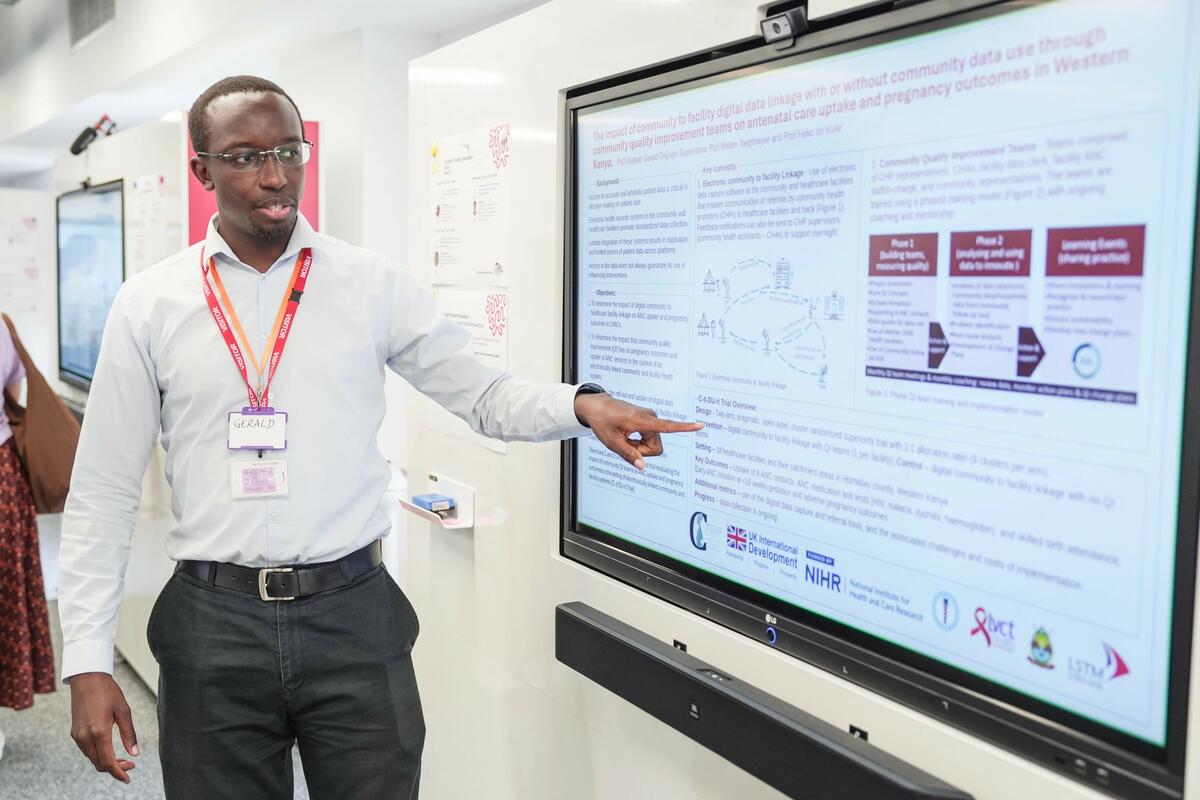
When I first approached Gerald with a request to tell us about him and his PhD journey, he responded with warmth, curiosity, and an openness that stayed with me. Despite a full schedule and mounting deadlines, he agreed to take part in this new series profiling PhD students. A few weeks later, he returned a thoughtful and honest account of his journey, offering a window into the realities of research, family life, and the quiet resilience required to pursue a PhD in Global Health.
Gerald is a Clinical Research Scientist at the Kenya Medical Research Institute’s Centre for Global Health Research in Kisumu, Western Kenya. He’s a medical doctor with a master’s in Epidemiology and is currently undertaking a PhD in Global Health at the Liverpool School of Tropical Medicine (LSTM). His research explores how digital tools might help improve referrals from the community to healthcare facilities, an often-overlooked link in the chain of health systems.
“There is a lot of interest in developing and deploying new software and applications in the healthcare field. More thought needs to be put on how effective these tools are because they divert resources that could be used in more impactful ways. There is also little discussion about the risks they could introduce like user frustration and demotivation especially when they don’t work as expected, or worse still lead to lost data and time.”

From Curiosity to Community Health
Gerald traces his interest in research back to his undergraduate studies, where two experiences made a lasting impact: an intercalated degree in Medical Physiology and a data entry job at AMREF during a school break.
“Both these exposures piqued my interest as they resonated with my inquisitive nature and scientific mindset.”
That curiosity stayed with him. After years working in both public and private referral hospitals and later managing diverse research projects from antimicrobial resistance to health systems during healthcare worker strikes, Gerald began to see the broader structural challenges that influence patient outcomes.
“I am interested in understanding health systems so that I can discover and implement interventions to improve them.”
His decision to pursue a PhD was driven by a mix of admiration and ambition:
“In my previous role, I worked with PhD holders, and I admired their depth of knowledge in their subject areas, and it reflected the type of professional I would want to be. I have an interest in teaching, and this would help me fulfil this. I also have a type A personality, and I want to climb to the highest academic level I can get to.”
The Research: Connecting Tools and Teams
Gerald’s PhD is embedded in a larger multi-partner project (C-it Du-it) led by LVCT, Kenya. His research uses multiple methods to evaluate digital referral tools and their integration into rural healthcare systems. He’s conducting a systematic review and meta-analysis, as well as a cluster randomized trial across 18 health facilities in Western Kenya.
“We introduced digital software in 18 facilities to link the community and facility electronic data capture systems enabling digital referrals and split these into 2 groups of 9. In one group, we introduced community quality improvement teams and are assessing the impact of these quality improvement teams in improving uptake of antenatal care in comparison to the 9 sites without the teams.”
From this study, Gerald also hopes to better understand the adoption of digital tools and the practical challenges that accompany them in real-world conditions.
“If the digital tools are ineffective, we need to understand why and intervene to make them effective.”
Beyond the Data: A Life in Balance
Gerald describes himself as “reserved, contemplative, cautiously optimistic, sarcastic, unobtrusive “and much of that quiet thoughtfulness shows in how he talks about his life outside of work. He’s a devoted husband and father, sharing everyday routines and weekend adventures with his son and wife.
“We enjoy travelling, reading (we try to read at least 2 books a year together - our current read is ‘Theodicy of Love’ by Dr John C. Peckham), cooking, physical activities (from gym to half-marathons), and spiritual activities (attending church services and related programs – marriage seminars, children’s classes).” He also finds joy in photography, classical music, and hiking.
If life had taken a different path?
“I would probably be building cars, robots, a photographer, a neurosurgeon or a chef.”
Resilience in the Research Journey
Like many doctoral researchers, Gerald has had to manage both intellectual and emotional highs and lows. Among the reflections he shared, his dry sense of humour stood out, especially when describing those fleeting flashes of inspiration familiar to any researcher:
“The light bulb moments when a ‘seemingly’ brilliant idea comes to mind. I say ‘seemingly’ because it’s brilliant until I share it with my supervisors.”
Rejections from journals, conferences, and fellowships have been especially tough.
When asked what keeps him awake at night? “Submission deadlines”, he says plainly. “But I guess the bigger question is why I’m intent on Health Systems Strengthening research, to which the short answer is that I hate going to hospitals, both private (because I feel I’ll waste time and money) and public (because I may not get the service or the quality needed). In one of our site visits, we found that the single clinical staff stationed there was away for a training that day and a mother in advanced labour came to the hospital. She didn’t know that the midwife wouldn’t be there, and it was too late to go to another facility. Thankfully we mustered our collective clinical acumen and helped with the delivery, but I shudder at the thought of what would have happened if she developed a complication had we not been there. Our health systems have deficiencies, and we need to channel our efforts in addressing these so that we can get the experience we deserve when we interact with them.”
But he also speaks with deep appreciation for the people who have supported him.
“My wife has supported me with my transition into my PhD life as it entailed relocating to a new town, finding a new home (which was a 1-year nightmare) and balancing her work and travel around my work and school. My direct supervisor at work and PhD supervisors were very understanding and helpful with helping me find my footing and offered the additional support I needed to stay on track.”
Looking Ahead: Thoughtful Impact
After completing his PhD, Gerald wants to focus on implementation and scale, making health system interventions not just work in theory, but stick in practice. He’s already worked on innovative projects that blend technology and health: from using ambulatory blood pressure monitoring, to teleradiology for heart ultrasounds, and AI-supported pregnancy screening tools all in rural and underserved settings of Kenya.
What does he want people to take away if his research reaches a broader audience?
“We need to think through what we are investing in (does it really have an impact or is it good for optics?) and how we are investing it (is it reaching those who need it and is it sustainable?).”
Legacy and Advice
When asked what legacy he hopes to leave behind, Gerald answers without pretence:
“Supporting the underserved and underprivileged; mentoring junior researchers/doctors; being someone who actually cared.”
And for those considering the PhD path?
“Ask yourself whether you need to do a PhD in the first place and only proceed if your answer is an emphatic ‘yes’. If you chose to pursue one, remember that it’s a marathon (and not a sprint) that needs patience, resilience, slow consistent steps towards the finish line and a supportive team of supervisors, mentors, family, friends and fellow PhD students.”
In both his research and personal life, Gerald seems driven not by accolades, but by a steady commitment to doing the work - carefully, critically, and with lasting purpose.
We thank Gerald for sharing his story and look forward to following the next steps in his research journey.
By Felicia Ohl, Communication Officer Health Equity, LSTM, in conversation with Dr. Gerald Ong’ayo, Clinical Research Scientist, KEMRI and PhD student, LSTM